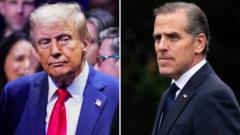In light of recent pardons and high-profile prosecutions, President Biden and former President Trump present eerily similar defenses against allegations of political bias in their legal troubles, raising questions about the integrity of the justice system and public trust.
The Troubling Echoes of Political Prosecutions: Biden and Trump

The Troubling Echoes of Political Prosecutions: Biden and Trump
A deep dive into the uncanny similarities between the legal challenges faced by President Joe Biden's son and former President Donald Trump, revealing how both narratives are reshaping public perceptions of justice.
The parallels between the legal challenges faced by President Joe Biden’s son Hunter and former President Donald Trump have sparked intense discussion regarding justice and politics in America. Despite the considerable differences in their situations, both have raised critical questions about political influence on the judicial system.
In response to backlash over his son’s legal issues, Biden recently announced a "full and unconditional" pardon for Hunter, denouncing the prosecution as unfairly motivated by his familial ties. “No reasonable person can look at the facts of Hunter’s cases and conclude anything other than he was targeted because he is my son – and that is wrong,” Biden asserted, mimicking the language often used by Trump and his allies in defense of claims of politically charged legal proceedings.
This sentiment aligns closely with Trump's response to the judiciary's actions against him, particularly regarding the hush-money payments case that resulted in his conviction for falsifying business records. "What’s going on in New York is an outrage," expressed Senator Lindsey Graham, reinforcing the notion of selective prosecution for political purposes.
The resemblance of their cases extends beyond rhetoric; both were tried in 2024, several years after the alleged misconduct—Trump's payments were made in 2016 and Hunter Biden's cases stem from events between 2016 and 2018. Additionally, both cases involve rare prosecutions based on existing laws that are typically overlooked by prosecutors. This aligns with concerns on both sides of the political spectrum about the fairness of the judicial system.
However, there are clear distinctions. Trump’s issues arise from his time in office, while Hunter Biden’s troubles do not involve any public office. Moreover, Trump faces multiple prosecutions tied to allegations that are more severe than those impacting his son. Still, both narratives are framed within a similar context of political exploitation, with Trump labeling his legal troubles as “political witch hunts” while Biden claims his son is a victim of overreach.
Experts in the field highlight that the public’s view of prosecutorial motivations is often misguided, with many failing to understand the complex factors guiding prosecutorial discretion. This misunderstanding may lead to a perceived double standard, especially in cases involving high-profile figures and their families.
As Hunter Biden moves forward without the weight of criminal penalties due to the pardon, the implications for Trump as he attempts to return to prominence are profound. Public faith in the criminal justice system continues to erode, highlighted by John Geer, a political science professor who notes a disturbing wave of distrust towards government institutions.
The ongoing narratives from both Biden and Trump reflect a visceral sentiment among the populace, tapping into a larger crisis where both politicians leverage their legal predicaments to reinforce their positions. President Biden’s adoption of Trump-like rhetoric to articulate his son’s pardon only highlights how this cycle of distrust in institutions can shape political futures, urging a reevaluation of what justice means in a deeply polarized society.
In response to backlash over his son’s legal issues, Biden recently announced a "full and unconditional" pardon for Hunter, denouncing the prosecution as unfairly motivated by his familial ties. “No reasonable person can look at the facts of Hunter’s cases and conclude anything other than he was targeted because he is my son – and that is wrong,” Biden asserted, mimicking the language often used by Trump and his allies in defense of claims of politically charged legal proceedings.
This sentiment aligns closely with Trump's response to the judiciary's actions against him, particularly regarding the hush-money payments case that resulted in his conviction for falsifying business records. "What’s going on in New York is an outrage," expressed Senator Lindsey Graham, reinforcing the notion of selective prosecution for political purposes.
The resemblance of their cases extends beyond rhetoric; both were tried in 2024, several years after the alleged misconduct—Trump's payments were made in 2016 and Hunter Biden's cases stem from events between 2016 and 2018. Additionally, both cases involve rare prosecutions based on existing laws that are typically overlooked by prosecutors. This aligns with concerns on both sides of the political spectrum about the fairness of the judicial system.
However, there are clear distinctions. Trump’s issues arise from his time in office, while Hunter Biden’s troubles do not involve any public office. Moreover, Trump faces multiple prosecutions tied to allegations that are more severe than those impacting his son. Still, both narratives are framed within a similar context of political exploitation, with Trump labeling his legal troubles as “political witch hunts” while Biden claims his son is a victim of overreach.
Experts in the field highlight that the public’s view of prosecutorial motivations is often misguided, with many failing to understand the complex factors guiding prosecutorial discretion. This misunderstanding may lead to a perceived double standard, especially in cases involving high-profile figures and their families.
As Hunter Biden moves forward without the weight of criminal penalties due to the pardon, the implications for Trump as he attempts to return to prominence are profound. Public faith in the criminal justice system continues to erode, highlighted by John Geer, a political science professor who notes a disturbing wave of distrust towards government institutions.
The ongoing narratives from both Biden and Trump reflect a visceral sentiment among the populace, tapping into a larger crisis where both politicians leverage their legal predicaments to reinforce their positions. President Biden’s adoption of Trump-like rhetoric to articulate his son’s pardon only highlights how this cycle of distrust in institutions can shape political futures, urging a reevaluation of what justice means in a deeply polarized society.




















